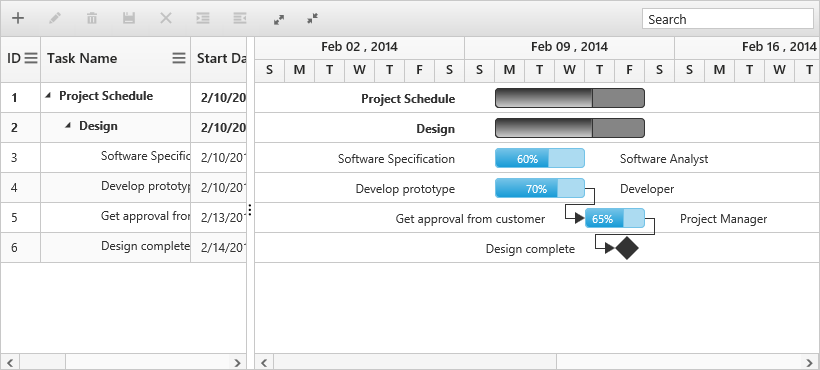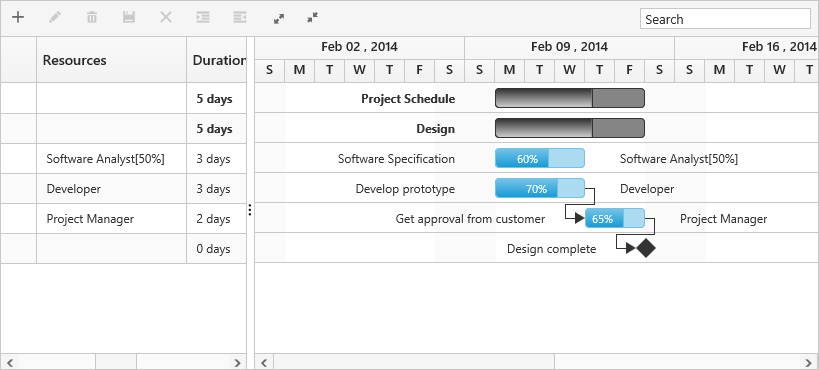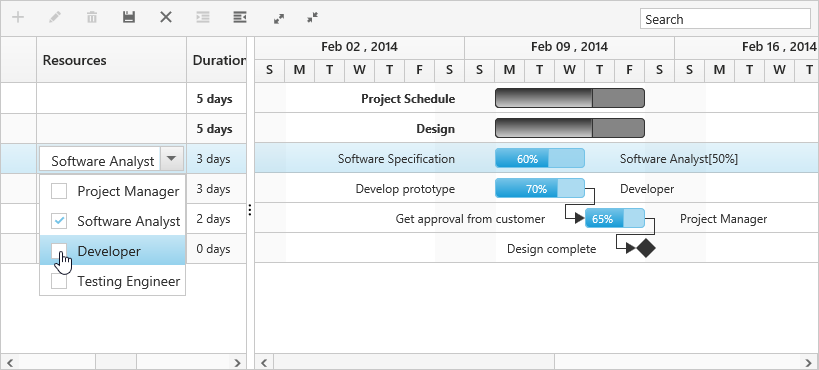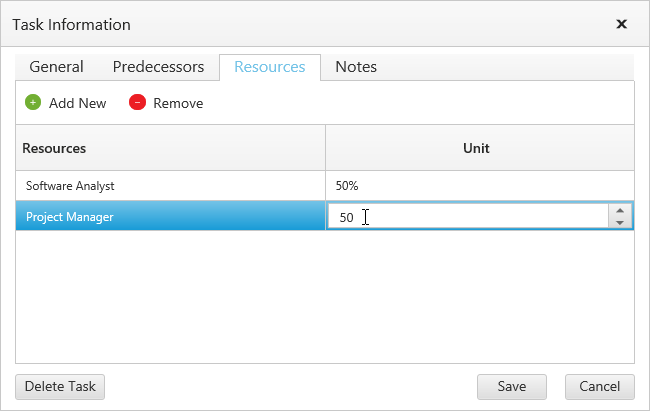- Resource Collection
- Assign Resource
- Assign Resources with Unit
- Edit Resource Collection
Contact Support
Resources
22 Mar 20188 minutes to read
Resources are represented by staff, equipment and materials etc. In Gantt control you can show /allocate the resources (human resources) for each task.
Resource Collection
The resource collection contains details about the resources that are used in the project. Resources are List object that contains id and name of the resources and this collection is mapped to the Gantt control using Resources property.
Id and name field of the resources are mapped by using the ResourceIdMapping and ResourceNameMapping properties.
The following code snippets shows resource collection object and how it assinged to Gantt control.
@(Html.EJ().Gantt("Gantt")
//…
.ResourceIdMapping("ResourceId")
.ResourceNameMapping("ResourceName")
.Resources(ViewBag.resource)
)
@(Html.EJ().ScriptManager())public ActionResult Resource()
{
ViewBag.resource = this.GetResources();
//...
return View();
}
// Create resource collection
public class Resource
{
public int ResourceId { get; set; }
public string ResourceName { get; set; }
}
//...
public List<Resource> GetResources()
{
List<Resource> ResourceCollection = new List<Resource>();
ResourceCollection.Add(new Resource() { ResourceId = 1, ResourceName = "Project Manager" });
ResourceCollection.Add(new Resource() { ResourceId = 2, ResourceName = "Software Analyst" });
ResourceCollection.Add(new Resource() { ResourceId = 3, ResourceName = "Developer" });
ResourceCollection.Add(new Resource() { ResourceId = 4, ResourceName = "Testing Engineer" });
return ResourceCollection;
}Assign Resource
We can assign resources for a task at initial load, using the resource id value of the resources as a collection. This collection is mapped from the DataSource to the Gantt control using the ResourceInfoMapping property.
The following code snippet shows how to assign the resource for each task and map to Gantt control.
@(Html.EJ().Gantt("Gantt")
//…
.ResourceInfoMapping("Resources")
.Datasource(ViewBag.datasource)
)
@(Html.EJ().ScriptManager())public ActionResult Resource()
{
ViewBag.datasource = GetData();
//...
return View();
}
public class ResourceData
{
//...
public List<int> Resources { get; set; }
}
public List<ResourceData> GetData()
{
//..
List<ResourceData> list = new List<ResourceData>();
list.Add(new ResourceData()
{
//...
Resources =new List<int>(){2},
//..
});
return list;
}The following screenshot shows Gantt control with resources.

Assign Resources with Unit
Resource units indicates the amount of work done by a resource for the task. We can specify the resource unit for the each assigned resource for a particular task.
Resource unit value is mapped to the Gantt tasks from the datasource using ResourceUnitMapping property.
The below code snippets shows how to assign resource unit value.
@(Html.EJ().Gantt("Gantt")
//…
.ResourceInfoMapping("Resources")
.ResourceUnitMapping("ResourceUnit")
.Datasource(ViewBag.datasource)
)
@(Html.EJ().ScriptManager())public ActionResult Resource()
{
ViewBag.datasource = GetData();
//...
return View();
}
public class ResourceObject
{
public int ResourceId { get; set; }
public int ResourceUnit { get; set; }
}
public class ResourceData
{
//...
public List<ResourceObject> Resources { get; set; }
}
public List<ResourceData> GetData()
{
//..
List<ResourceData> list = new List<ResourceData>();
list.Add(new ResourceData()
{
//...
Resources = new List<ResourceObject>(){ new ResourceObject(){ ResourceId=2, ResourceUnit=50}},
//..
});
return list;
}The following screenshot shows Gantt control with resource units.

Edit Resource Collection
By using cell edit option we can add/remove the resource for particular task and by using dialog edit support we can modify the resource unit value also.
Refer this link to know more about editing in Gantt control.
The following screenshot shows the resource edit option in Gantt.

Editing resource with cell edit

Editing resource with edit dialog
NOTE
While editing, resource values are saved with resource unit value when resource unit is not equal to 100% like below.
public ActionResult Resource()
{
ViewBag.datasource = GetData();
//...
return View();
}
public class ResourceObject
{
public int ResourceId { get; set; }
public int ResourceUnit { get; set; }
}
public class ResourceData
{
//...
public List<ResourceObject> Resources { get; set; }
}
public List<ResourceData> GetData()
{
//..
List<ResourceData> list = new List<ResourceData>();
list.Add(new ResourceData()
{
//...
Resources = new List<ResourceObject>(){ new ResourceObject(){ ResourceId=2, ResourceUnit=50}},
//..
});
return list;
}NOTE
When resource unit is 100%, resource value is stored with ID only.
public ActionResult Resource()
{
ViewBag.datasource = GetData();
//...
return View();
}
public class ResourceData
{
//...
public List<int> Resources { get; set; }
}
public List<ResourceData> GetData()
{
//..
List<ResourceData> list = new List<ResourceData>();
list.Add(new ResourceData()
{
//...
Resources =new List<int>(){2},
//..
});
return list;
}NOTE
The unit values are updated to the resources assigned to the Gantt tasks, only when mapping resource units data source field using the
ResourceUnitMappingproperty.
Resource unit will be updated while editing the duration and work fields with respective to task type.